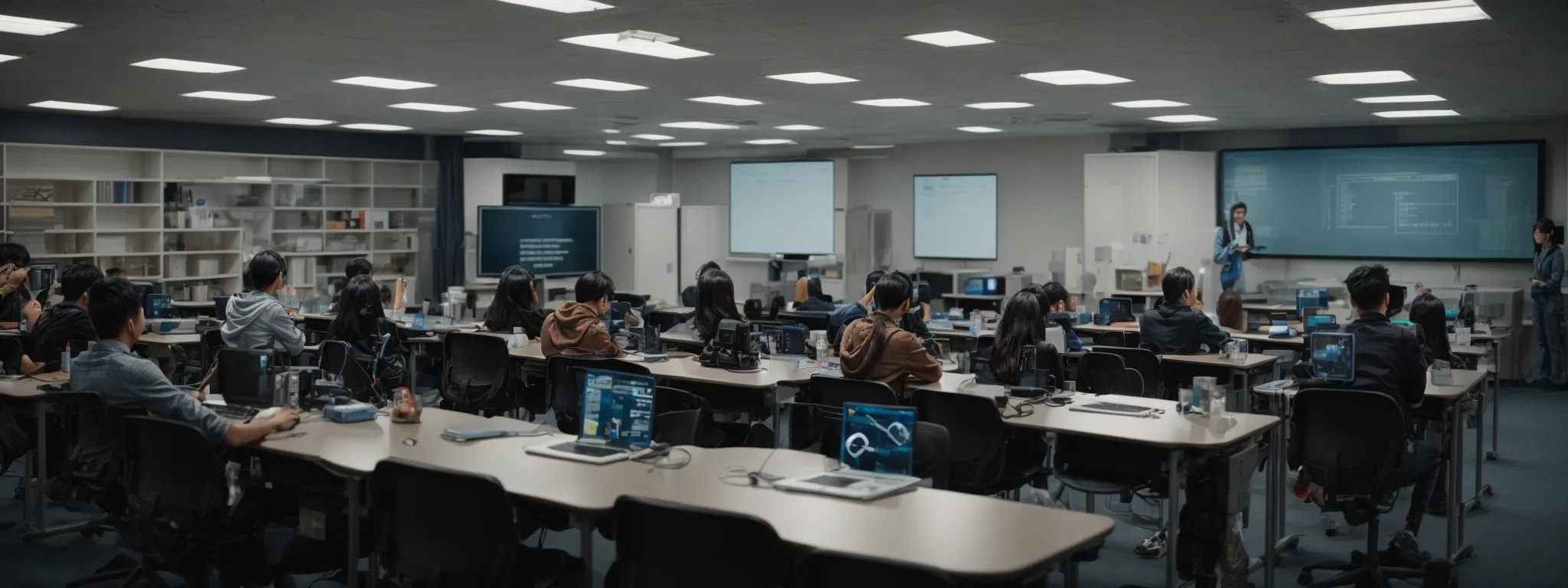Formal SEO Higher Education Options: Navigating Academic Paths
Exploring Formal SEO Education: Comprehensive Guide to Higher Education Paths The landscape of search engine optimization is ever-evolving, with its complex strategies and techniques becoming a cornerstone […]
Exploring Formal SEO Education: Comprehensive Guide to Higher Education Paths
The landscape of search engine optimization is ever-evolving, with its complex strategies and techniques becoming a cornerstone of successful digital marketing.
As the demand for skilled SEO experts surges, the importance of formal education in SEO becomes more pronounced, offering students and professionals structured pathways to mastering this critical field.
From graduate programs in top-tier institutions to specialized certifications, these educational avenues equip individuals with a deep understanding of SEO’s intricacies and practical applications.
Entering the realm of higher education SEO can vastly enhance one’s career trajectory, providing the tools and knowledge necessary to excel in the competitive digital space.
Keep reading to uncover the rich tapestry of SEO education opportunities that await the ambitious learner.
Key Takeaways
- Formal Education in SEO Offers Structured Learning and Access to Advanced Tools Like the Search Atlas SEO Tool
- Balancing Theoretical Knowledge With Practical Application During SEO Studies Enhances Real-World Skills
- Networking Opportunities and Internships Through Formal Programs Provide Significant Career Advantages in SEO
- Continuous Professional Development and Adaptation to New SEO Trends Are Necessary for a Sustainable Career
- Advanced SEO Education and Specialized Training Prepare Professionals for Leadership Roles Beyond Technical Expertise
Mapping Out Formal SEO Education Pathways

Embarking on a formal education in search engine optimization (SEO) necessitates a strategic approach to selecting the right institution and program format that will best satisfy an individual’s learning and career objectives.
Prospective SEO students must evaluate accredited institutions to discern those that offer robust SEO programs, contemplating the merits of online verses traditional classroom education.
Delving into the curriculum, it’s essential to understand the core modules that lay the foundation for expertise in this dynamic field.
Aspects such as the duration of the program and the flexibility of scheduling are pivotal considerations for learners aiming to balance academic pursuits with other commitments.
Furthermore, reviewing the qualifications and industry connections of faculty members offers insights into the caliber of education and future networking opportunities.
Ultimately, an analysis of how theories are integrated with practical application within the program will guide students to a comprehensive understanding of SEO best practices.
This initial exploration provides a compass for navigating the educational landscape of SEO in higher education, an essential step for those aspiring to excel in this ever-evolving sector.
Identifying Accredited Institutions Offering SEO Programs
As future SEO strategists weigh their educational options, it is imperative for them to seek out institutions that not only teach SEO but also boast accreditation, a hallmark of quality and rigor. Accredited higher education institutions offer an assurance that their SEO programs meet stringent standards, thereby providing a solid and well-respected foundation in this intricate field.
Through LinkGraph’s consultative services, those aspiring to delve into the world of search engine optimization receive guidance on the nuances of choosing top-tier educational programs. LinkGraph’s SEO experts emphasize the importance of selecting programs that stay abreast of evolving search engine algorithms, blending theoretical knowledge with hands-on skills that align with current industry demands.
Exploring Online vs. Traditional Classroom SEO Education
Choosing between online and traditional classroom environments for an SEO education presents unique opportunities for prospective students. While online programs provide the advantage of flexibility, essential for those balancing family commitments or full-time employment, traditional classrooms offer the structure and social interaction that can enrich the learning experience.
The decision hinges on the student’s preferred learning style and their ultimate career goals: the immediacy of feedback in a physical classroom versus the self-paced nature of online learning. An evaluation of these educational formats will inform a decision that greatly impacts a student’s absorption and application of SEO knowledge.
| Learning Aspect | Online Education | Traditional Classroom |
|---|---|---|
| Flexibility | High | Low |
| Interactivity | Varies | High |
| Networking | Online Forums/Events | Direct Contact |
| Learning Pace | Self-directed | Structured |
| Feedback Timing | Delayed | Immediate |
Understanding the Curriculum and Core Modules
In the journey to mastering search engine optimization, a meticulously crafted curriculum serves as the backbone of any formal SEO program. Prospective students analyze core modules that define the skill set required to excel in the SEO landscape: from keyword research to understanding the intricacies of search engine algorithms.
The depth and breadth of the curriculum are crucial, ensuring learners grasp the technicalities of on-page and off-page optimization, the role of backlinks in enhancing web page authority, and the nuances of user experience that influence SERPs. A program’s comprehensiveness is evaluated through the diversity of its modules, covering everything from schema markup to content marketing analytics:
| Core Module | Objective | Learning Outcome |
|---|---|---|
| Keyword Research | To understand user intent and search patterns | Ability to identify and target strategic keywords |
| On-Page SEO | To optimize individual web pages for higher rankings | Skills to enhance content visibility in search results |
| Off-Page SEO | To build domain authority through external signals | Competency in acquiring quality backlinks and social shares |
| Technical SEO | To ensure a website’s technical framework aids search accessibility | Expertise in site architecture, mobile optimization, and indexing |
| Analytical Skills | To dissect performance data for informed SEO strategy | Proficiency in using tools like Search Atlas for real-time analytics |
Assessing Program Duration and Scheduling Flexibility
The pursuit of a formal education in SEO requires an analysis of program length and scheduling options, as these factors determine the trajectory of one’s academic and professional advancement. Potential students must consider the time investment of various degree programs, ensuring the chosen tract offers a manageable pace that coherently fits within the constraints of personal and professional obligations.
Flexibility in scheduling is a fundamental aspect for many learners, as it allows for the alignment of educational pursuits with life’s unpredictable rhythms. Programs that accommodate part-time enrollment or offer asynchronous course options can serve as a bridge for students who must negotiate their education around full-time jobs, caregiving duties, or other commitments that necessitate a non-traditional approach to academic timelines.
Reviewing Faculty Expertise and Industry Connections
Faculty expertise and industry connections stand as pivotal elements in the evaluation of formal SEO education programs. Students must consider the credentials of instructors, who should possess not only academic accolades but also real-world experience within the SEO sphere, ensuring that their teachings are seasoned with practical insights and the latest industry practices. Such expertise often translates into meaningful mentorships that significantly enhance learning outcomes and career prospects.
Moreover, the industry connections fostered by a program can vastly improve students’ pathways into the SEO sector. Academic institutions that maintain robust relationships with leading SEO firms, like LinkGraph, and host regular events with industry professionals offer unprecedented access to internships, job placements, and networking opportunities that could prove invaluable in a competitive field.
Evaluating the Balance Between Theory and Practical Application
In the quest for mastery in search engine optimization, striking an ideal balance between theoretical knowledge and applied skills is vital. Students must seek programs that harmonize conceptual learning with tangible, real-world SEO challenges: fostering an educational experience where theory informs practice and vice versa.
A curriculum weighted favorably between these elements empowers graduates to not only understand SEO principles but also to implement them effectively within diverse markets and platforms. This harmonious balance ensures that scholarly insights evolve into strategies that drive search result success and user engagement.
- Seek SEO programs with a strong theoretical foundation, ensuring a thorough understanding of SEO principles.
- Assess courses that promise hands-on projects, case studies, and the utilization of SEO tools like Search Atlas for practical application.
- Prioritize institutions that bridge the gap between classroom instruction and real-world SEO scenarios.
Analyzing the Value of SEO Degrees and Certifications

The landscape of professional development in search engine optimization presents an array of academic pathways, from comprehensive degree programs to specialized certifications.
With the acceleration of digital marketing importance, the sector places a premium on validated expertise and practical know-how.
Individuals considering an investment in SEO education must weigh the return on investment of various credentialing options, understanding which qualifications resonate with industry employers.
This involves both a scrutiny of graduate success within the field and a thorough exploration of funding avenues such as scholarships and financial aid tailored for SEO studies.
Additionally, ongoing professional development opportunities in SEO underscore the need for a commitment to continual learning within this ever-evolving discipline.
Comparing the ROI of Degree Programs Versus Certifications
Determining the return on investment (ROI) for SEO education hinges on an in-depth comparison between the long-term value of degree programs and the immediate applicability of certifications. Degrees often entail a comprehensive curriculum, potentially leading to a more profound mastery of SEO, but may require a significant time and financial commitment.
Certifications, on the other hand, offer a focused and accelerated learning path that can quickly enhance a professional’s skills, an advantage for those looking to promptly apply new knowledge within the marketplace:
- SEO degree programs often cover a wider breadth of knowledge, potentially translating into broader career opportunities and a stronger foundation in the field.
- Certifications provide specialization in particular areas of SEO, equipping professionals with targeted expertise that can immediately impact their work.
- Both educational paths require an investment, yet the immediacy of certifications may align better with professionals seeking minimal disruption to their current roles.
Professionals must weigh these factors, considering not only their current expertise and career goals but also the evolving demands of the SEO landscape. This careful deliberation ensures that the education chosen maximizes career advancement and contributes to the success of their organization’s SEO strategy.
Recognizing the Credentials That Industry Employers Value
An appreciation of the credentials esteemed by industry employers plays a crucial role when individuals hone their educational strategy within the field of search engine optimization. It is the intersection where academic accomplishment and industry relevance must coalesce, encouraging students to select programs that not only educate but also endow them with qualifications that resonate in the professional SEO landscape.
LinkGraph, a distinguished SEO firm, underscores the significance of both practical skills and comprehensive understanding, as reflected in candidates with SEO degrees or certifications. These credentials signal to employers a candidate’s commitment to mastering SEO, bridging the gap between theoretical teachings and the ability to drive impactful SEO strategies in a real-world context.
Examining Success Stories of SEO Education Graduates
Stories of triumph within the realm of search engine optimization education are numerous, showcasing graduates who have transitioned into roles that shape the digital strategies of prominent firms and organizations. Their testimonies illuminate the practical benefits that formal SEO education can yield, marrying academic prowess with industry success.
Graduates often attribute their ascent in the SEO field to the comprehensive training and hands-on experiences facilitated by their studies. LinkGraph’s track record of student success stories spotlights the potent combination of formal education and Search Atlas tools, which together pave the way for graduates to influence and innovate within the ever-expanding SEO landscape.
Navigating Scholarships and Financial Aid Opportunities for SEO Studies
Securing financial aid or scholarships profoundly impacts the accessibility of SEO higher education paths. Recognizing this, LinkGraph extends advisory services to aid prospective students in identifying scholarship opportunities that align with their pursuit of SEO excellence in academic institutions.
Integrating financial planning into one’s educational journey opens the door to higher learning in SEO without the burden of prohibitive costs. LinkGraph embraces a role in guiding students toward both merit-based and needs-based financial support systems, ensuring that talent and ambition in the SEO field are not impeded by economic constraints.
Investigating Continuing Education and Professional Development in SEO
Professional growth in the field of search engine optimization is an ongoing endeavor, and continuing education plays a vital role for practitioners keen on maintaining their edge in the industry. LinkGraph champions the importance of lifelong learning by offering access to the latest tools and techniques through advanced courses and workshops in SEO.
Staying current with the rapid evolution of search algorithms necessitates that SEO professionals engage in continuous professional development. Participation in advanced training programs and industry conferences not only nurtures an individual’s SEO skill set, but it also fosters a community of learning where professionals can exchange innovative ideas and strategies.
Unraveling the Pros and Cons of Formal SEO Education

The pursuit of formal education in search engine optimization (SEO) presents a myriad of considerations for both aspiring professionals and seasoned experts seeking to deepen their expertise.
As the digital landscape constantly evolves with technological advancements and shifting search engine algorithms, the question of formalized learning pathways becomes increasingly complex.
From the all-encompassing curricula of higher education programs to the robust networking opportunities they can provide, individuals must meticulously analyze the advantages and potential limitations of embarking on a structured SEO educational route.
In juxtaposition, the rapid pace at which SEO progresses calls for a critical examination of the current educational syllabi and their ability to keep pace with industry trends.
As such, this section delves into the core aspects of formal SEO education—scrutinizing both the long-term benefits and the challenges it may yield in an industry where self-taught expertise has also proven valuable.
Delving Into the Depth and Comprehensiveness of Formal SEO Programs
The analysis of formal SEO education programs demands scrutiny of their depth and scope, as these factors largely determine a program’s efficacy in equipping students for the fast-evolving digital marketing arena. Discerning students closely scrutinize program syllabi, seeking a level of academic rigor that fosters not only familiarity with foundational SEO concepts but also skill proficiency in advanced optimization techniques and online user engagement strategies.
In evaluating formal SEO educational offerings, the impetus lies on assessing the integration of up-to-date industry practices with comprehensive coursework structure. Diligence in this evaluation helps ensure that the pedagogical design of a program mirrors the intricacy of real-world SEO challenges and arms graduates with a blend of strategic and analytical competences essential for making substantive impacts in the search engine landscape.
Weighing the Costs of Education Against Self-Taught Learning
Investment in formal SEO education or choosing the path of self-guided learning presents a critical financial consideration. The cost of degree programs or certifications must be balanced against the multifarious array of free or low-cost resources available to self-starters in the SEO domain.
While formal education often comes with a significant price tag, it provides structured learning and an arsenal of tools exemplified by offerings like LinkGraph’s Search Atlas SEO tool. The comprehensive environment of a classroom, the systematic approach to complex subjects, and the qualification credentials add value beyond monetary terms:
| Education Path | Financial Investment | Structured Learning | Industry Tools Access |
|---|---|---|---|
| Formal SEO Education | Higher | Yes | Comprehensive (e.g., Search Atlas) |
| Self-Taught Learning | Lower | No | Limited |
This approach enables professionals to make an informed decision based on their personal and career aspirations, financial capability, and preferred learning style, paving a viable path in the dynamic arena of SEO.
Debating the Necessity of Formal Education for SEO Success
The debate over the necessity of formal education for SEO success centers on striking the right balance between traditional academia and the dynamic, often self-directed nature of search engine optimization. Critics point out that the fast-paced, ever-changing landscape of SEO can sometimes outpace the fixed curricula of formalized classes, suggesting that experiential learning might offer more timely and relevant insights into current best practices.
Proponents of formal SEO education, however, argue for its structured approach and the breadth of knowledge it often encompasses, advocating that it lays a comprehensive groundwork that can be built upon with ongoing learning and field experience. They emphasize the advantage of higher education in cultivating a network of peers and mentors who can accelerate career growth and open doors to new opportunities:
| Consideration | Formal Education | Experiential Learning |
|---|---|---|
| Curriculum Relevance | Structured, potentially delayed updates | Adapts to industry changes rapidly |
| Networking Opportunities | Potentially more extensive | Depends on individual initiative |
| Cost | Typically higher | Lower or none |
| Scope of Knowledge | Comprehensive foundation | Specialized to immediate needs |
| Career Advancement | Qualifications could open more doors | Success hinged on demonstrable skills |
Considering the Pace of Industry Change Versus Curriculum Updates
The dynamic SEO industry is known for its rapid pace of change, presenting a challenge for academic institutions to keep their curriculum abreast with the latest trends and best practices. As search engines like Google continually refine their algorithms, the gap between real-time industry developments and educational syllabi can widen, raising concerns about the immediate usefulness of one’s formal training.
Acknowledging this, institutions providing SEO education must foster relationships with industry leaders and adopt agile frameworks that allow for the swift integration of new insights and technology into their programs. The effectiveness of an SEO education often relies on how well it prepares students to adapt and apply their knowledge to a constantly evolving digital landscape:
- Curricula must be frequently revised to reflect changes in search engine algorithms and industry standards.
- Partnerships with SEO companies and tool providers can offer insights that enrich instructional material.
- Highly adaptive programs help ensure that students’ skills remain relevant and competitive in the job market.
Discussing the Networking Advantage in Higher Education Settings
In the landscape of higher education, networking emerges as a compelling advantage, enhancing the traditional path towards mastering search engine optimization. Students and alumni can tap into an institution’s established network, gaining access to industry professionals, potential mentors, and a wider community of peers who share similar aspirations and challenges within the field of SEO.
Access to exclusive events, guest lectures, and workshops within the campus oases becomes a fertile ground for fostering connections that can endure well beyond graduation. Such engagements not only provide insight into emergent SEO trends but also strengthen relationships with practitioners and thought leaders, advancing both academic and professional pursuits in profound ways.
Breaking Down Degree Levels in SEO Education

The pathway to mastering search engine optimization within the academic environment is replete with options, each varying in scope and depth of study.
Aspiring SEO professionals confront a pivotal decision: selecting a degree level that aligns with their career aspirations and industry requirements.
Within this context, it is essential for learners to comprehend the distinctions between associate, bachelor’s, and master’s degrees in SEO or adjacent fields like marketing.
Evaluating the benefits and limitations of each, individuals must determine which academic credential will provide them the competitive edge necessary for career progression.
Additionally, exploring the availability of SEO higher education programs around the globe is critical, as this reflects the extent to which the discipline has permeated academic institutions worldwide.
This guide serves as an exploration into these degree levels and their potential impact on professional trajectories in the evolving landscape of search engine optimization.
Understanding the Difference Between Associate, Bachelor’s, and Master’s
The selection of an SEO education level—associate, bachelor’s, or master’s—embodies a strategic decision aimed at aligning with one’s career objectives and the depth of expertise desired. An associate degree usually provides a foundational understanding of SEO principles, with a focus on technical skills and immediate applicability, serving as a springboard into entry-level positions or further study.
Bachelor’s degrees in SEO delve deeper, offering a comprehensive curriculum that covers all facets of search engine optimization alongside broader marketing concepts, equipping students for a diversity of roles within the digital marketing field. Master’s programs escalate the depth of study, fostering advanced strategic and research skills suitable for leadership roles and specialized consultancy in SEO:
- Associate degrees lay the foundational knowledge base and are geared toward practical, technical SEO skills.
- Bachelor’s degrees offer a more holistic and comprehensive study of SEO in conjunction with broader marketing strategies.
- Master’s degrees specialize in advanced techniques and strategic thinking, preparing graduates for high-level SEO challenges and leadership.
Deciding if an SEO-focused Degree or a Marketing Degree Is Better
In the decision-making process for formal education, individuals considering a career in SEO must deliberate between pursuing an SEO-focused degree or a broader marketing degree. An SEO-focused program typically delves into the nuances and technicalities specific to search engine optimization, offering a specialized skill set highly valued in SEO practitioner roles.
A marketing degree, by contrast, tends to provide a wider educational spectrum, embracing SEO as one component within a larger marketing toolkit. This broader approach equips graduates with versatile skills applicable across various aspects of marketing, ultimately broadening their career pathways while still encompassing essential SEO competencies.
Investigating Which Degree Levels Are Optimal for Career Aspirations
Within the sphere of formal SEO education, the alignment of degree levels with career aspirations is paramount for prospective students plotting their future in the digital marketing world. Individuals eager to dive headfirst into SEO practices may find that an associate degree equips them with sufficient skills to begin a career, while those envisioning leadership roles might consider bachelor’s or master’s programs to acquire a more profound, strategic skill set.
As students scrutinize the academic horizon, they recognize that master’s programs can serve as a catapult for those aiming to scale the heights of SEO consultancy or executive positions, demanding an advanced understanding of search engine dynamics and marketing strategies. It is this rigorous investigation into the academic offerings that will steer future SEO experts toward the credentialing that best complements their professional goals within the industry.
Surveying the Global Availability of SEO Higher Education Programs
In an era where digital expertise is paramount, the landscape of higher education has responded by offering SEO programs across the globe. From North America to Asia, institutions are acknowledging the critical role of SEO in the digital marketplace by developing specialized curricula designed to equip students for a technologically driven workforce.
However, the availability and depth of these programs can vary significantly by region: some areas boast a wide selection of comprehensive SEO degrees, while others may offer more condensed certificates or modules integrated into broader marketing courses. This variance underscores the importance of thorough research when selecting the ideal program that aligns with career objectives:
| Region | SEO Degree Availability | Program Depth |
|---|---|---|
| North America | Wide Selection | Comprehensive Programs |
| Europe | Moderate Selection | Mixed Comprehensive and Condensed Options |
| Asia | Growing Selection | Emerging Comprehensive Programs |
| Australia | Limited Selection | Condensed and Integrated Modules |
Integrating SEO Education With Career Development

As individuals embark upon the academic pursuit of search engine optimization, integrating their education with poignant career development opportunities becomes a cornerstone for future success.
By leveraging internship and co-op openings, students can apply academic theories to the test beds of real-world SEO challenges, gaining invaluable experience.
Aligning scholarly projects with practical scenarios, learners can compile portfolios that reflect tangible proficiency in SEO best practices.
Furthermore, academic settings often serve as crucibles for networking, enabling budding SEO professionals to connect with industry veterans and like-minded peers, building relationships that can propel their careers forward.
The synergy between formal education and proactive career planning equips graduates with a distinctive competitive edge in the dynamic realm of search engine optimization.
Leveraging Internships and Co-Op Opportunities in SEO
Internships and co-operative education programs offer a valuable bridge between academic learning and professional practice in the field of SEO. Engaging in these experiences allows students to conduits hands-on learning and cultivates their abilities within competitive, real-world settings, directly applying classroom-taught strategies to enhance search engine results and user experiences.
By collaborating with firms that specialize in SEO services, such as LinkGraph, learners gain pivotal insights and practical knowledge. Such engagements not only augment their academic foundations but also foster professional acumen, preparing them for the intricacies of keyword research, backlinks analysis, and marketing analytics integral to prevailing in today’s digital landscape.
Aligning Academic Projects With Real-World SEO Challenges
Formalizing the link between academic rigor and the pulsating heartbeat of SEO industries sharpens a student’s capability to maneuver through the complexities of the field. Tailoring academic projects to mirror real-world SEO demands enables learners to construct a bridge from theory to practice, ensuring competencies gained are immediately applicable upon graduation.
The steadfast aim is to ensure graduates from SEO programs are not merely versed in theoretical knowledge but are adept at navigating real-world scenarios. By dissecting and responding to contemporary SEO challenges within their academic projects, students cement a practical understanding that stands the test of rapidly changing digital environments.
| Component | Academic Emphasis | Real-World Application |
|---|---|---|
| Keyword Research | Understanding search intent and trends | Enhancing search engine visibility for businesses |
| Backlinks Analysis | Study of link quality and portfolio | Boosting a website’s authority and rankings |
| Content Optimization | Developing engagement through relevant content | Driving user engagement and conversions |
| Technical SEO | Grasping site architecture and indexability | Improving website crawlability and loading speed for users |
Building a Portfolio of SEO Work Through Academic Assignments
Academic assignments present a prime opportunity for students to manifest a professional portfolio reflective of their SEO capabilities. This compendium of work, encompassing thorough keyword analyses, strategic link building plans, and optimized content creation, becomes a tangible showcase of their alignment with industry standards and proficiency in search engine optimization.
Such a portfolio stands as a beacon to potential employers, evidencing a graduate’s preparedness to contribute constructively to SEO projects. By carefully curating projects completed over the course of their formal education, students draw together a narrative of growth, skill development, and competency in leveraging SEO tools like Search Atlas to produce measurable outcomes.
Networking With Industry Professionals Through Academic Platforms
Academic institutions often serve as conduits for students to engage with seasoned SEO professionals and industry leaders. Through academic platforms such as symposia, conferences, and seminars, students are presented with exceptional opportunities to forge professional connections, facilitating dialogues that may evolve into lasting professional relationships or mentorships.
Strategic partnerships between educational institutions and SEO firms become instrumental in broadening the students’ professional network. These collaborations enable students to gain firsthand exposure to cutting-edge industry practices and trends, laying a foundation for a vibrant career in search engine optimization.
Future-Proofing Your SEO Career With Advanced Education

In the rapidly evolving field of search engine optimization, a deep-seated understanding of the latest trends and technologies becomes crucial for the longevity and prosperity of an SEO career.
Formal education plays a pivotal role in equipping learners with advanced tools and analytical proficiencies required to navigate complex SEO landscapes.
With a focus on research-centric learning and comprehensive thesis projects, students enrich their SEO knowledge, fostering innovation and thought leadership in this dynamic sector.
As the demand for skilled SEO strategists grows, advanced education and tailored training programs become essential for professionals poised to assume leadership roles, driving industry progression through informed, data-driven optimization strategies.
Staying Ahead With Emerging SEO Trends and Technologies
Continually adapting to SEO trends and technologies is imperative for professionals who seek to maintain relevance and efficacy within the digital marketing arena. Confronted with an ever-shifting online ecosystem, it behooves those in the field of search engine optimization to vigilantly monitor and adopt new methodologies that shape search engine algorithms and user experience dynamics.
LinkGraph’s suite of SEO services provides clients and trainees with front-line access to emergent SEO tools and strategies that are crucial for a sustainable career trajectory. Emphasizing continuous education, practitioners are aided in staying current with sophisticated analytics tools and the deployment of innovations like voice search optimization and AI-driven content strategies:
| Trend/Technology | Impact on SEO | LinkGraph’s Role |
|---|---|---|
| Voice Search Optimization | Increases the need for conversational keyword strategies | Offers guidance on integrating natural language processing |
| AI-Driven Content | Enhances content relevance and personalization | Provides expertise in leveraging AI for content generation |
| Mobile-First Indexing | Prioritizes mobile-friendly website optimization | Advises on best practices for mobile user experience |
| EAT Principles | Strengthens the focus on expertise, authority, and trustworthiness | Helps clients to enhance website credibility and authority |
By interfacing with companies offering cutting-edge solutions, such as the features embedded within LinkGraph’s Search Atlas SEO tool, industry professionals can adeptly navigate the SEO field. This proactive approach, coupled with hands-on experience, ensures a mastery of tools that future-proof their expertise amidst the fast-growing demands of the digital marketplace.
Mastering Advanced SEO Tools and Analytics Through Formal Courses
Formal courses play a vital role in equipping SEO professionals with the advanced tools and analytics critical for excavating deep insights from vast data landscapes. Through structured academic programs, students are trained to employ sophisticated platforms like LinkGraph’s Search Atlas, enabling them to discern patterns and craft strategies that significantly optimize search engine presence.
The mastery of advanced SEO tools in scholarly settings allows for an analytical precision that is essential for shaping and measuring an organization’s SEO journey. Such academic pursuits arm graduates with the capabilities to wield analytics as a compass in the rapidly shifting terrains of digital marketing, ensuring their employers remain cognizant and adaptive to search engine developments.
The Importance of Research and Thesis Projects in Advancing SEO Knowledge
The immersion in research and thesis projects stands as a cornerstone for advancing one’s acumen in search engine optimization. This scholarly initiative allows students to explore uncharted territories within the field, fostering a culture of innovative thinking and evidence-based strategy formulation that keeps pace with the evolving algorithms and market demands.
Through the rigorous process of thesis development, future SEO professionals are tasked with the creation of original research, which serves as a proving ground for their hypothesis and theoretical knowledge. This substantial endeavor underscores their ability to distill complex information into actionable insights and reinforces the relevance of their skills in an industry driven by data and technology advancements.
Preparing for Leadership Roles With Advanced SEO Education and Training
Advancing to leadership roles within the SEO industry frequently requires a comprehensive understanding surpassing basic optimization tactics. This advancement necessitates advanced SEO education and specialized training that imbue professionals with the ability to guide teams, develop innovative strategies, and make data-driven decisions that will position their company at the forefront of digital marketing competition.
To holistically prepare for such pivotal positions, educational programs must concentrate on the development of both strategic insight and managerial competence. Leadership in SEO extends beyond the page to include employee direction, budget oversight, and cross-departmental coordination, making organizational and communication skills as essential as technical know-how:
- SEO leadership programs should focus on strategic planning and the implementation of SEO campaigns across various digital channels.
- These programs need to offer specialized training in team management and the allocation of resources to optimize results effectively.
- Students should be encouraged to develop robust communication skills to articulate and advocate for the significance of SEO within business objectives.
In essence, the pursuit of higher education in SEO for leadership roles involves a dual approach: refining expertise in SEO practices while simultaneously nurturing the leadership qualities necessary to inspire and manage a high-performing digital marketing team.
Conclusion
Embarking on a formal education journey in SEO is crucial for individuals aiming to navigate the complex and ever-evolving landscape of search engine optimization.
Through accredited institutions that offer in-depth, regularly updated curricula, students can acquire a solid understanding of both foundational and advanced SEO principles.
Whether through online or classroom settings, the right educational pathway empowers aspiring SEO professionals with the flexible scheduling, practical experience, and networking opportunities essential for success.
Graduates not only emerge with a portfolio demonstrating their skills but also gain recognition from industry employers for their commitment and expertise.
The continuous pursuit of advanced education and training, combined with keeping abreast of emerging technologies and trends, further prepares professionals for leadership roles and ensures their long-term viability in the competitive SEO industry.
Thus, the guide underscores the importance of diligent research and strategic decision-making when investing in formal SEO education as a means to secure a prosperous career in digital marketing.















































































